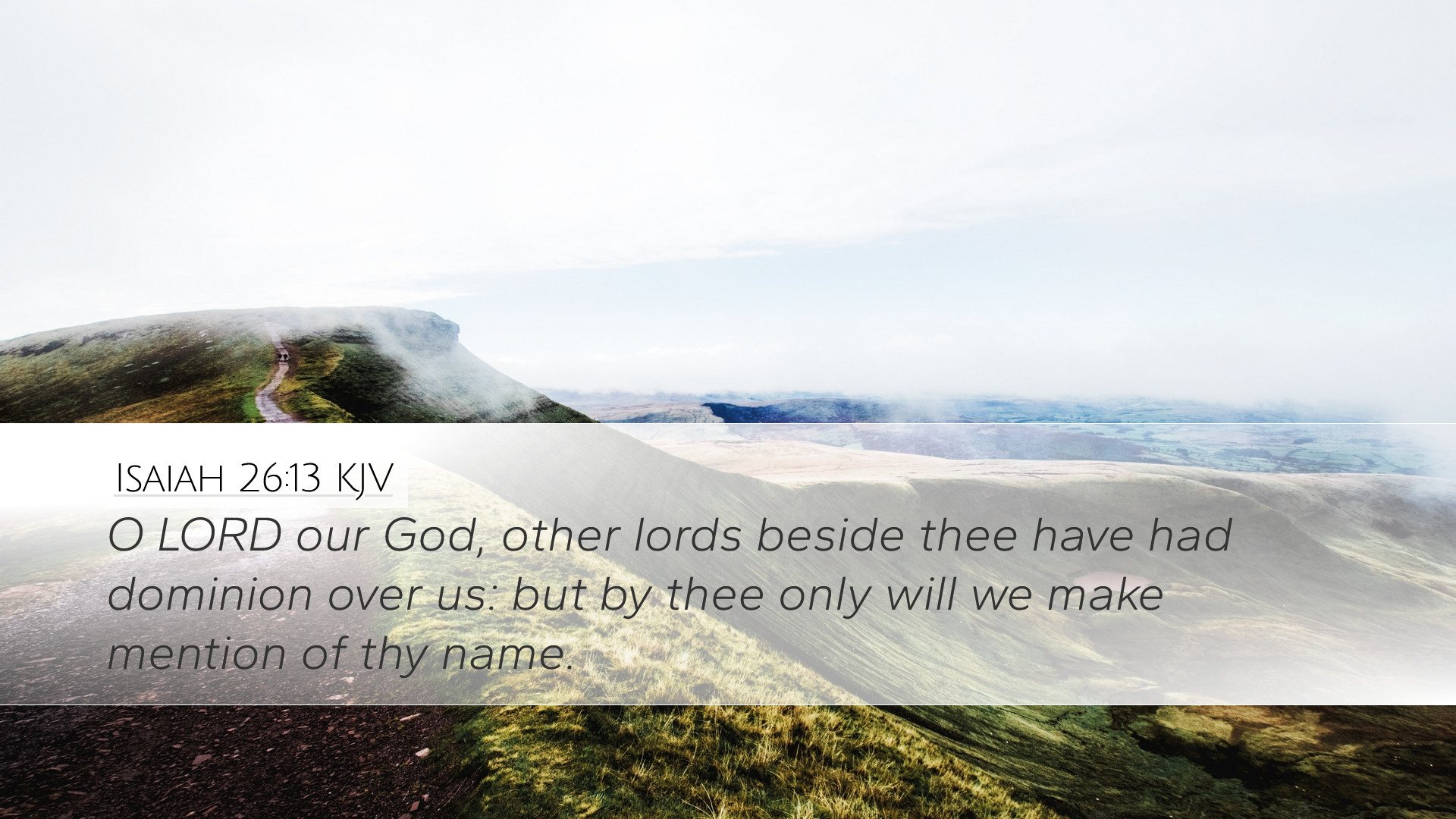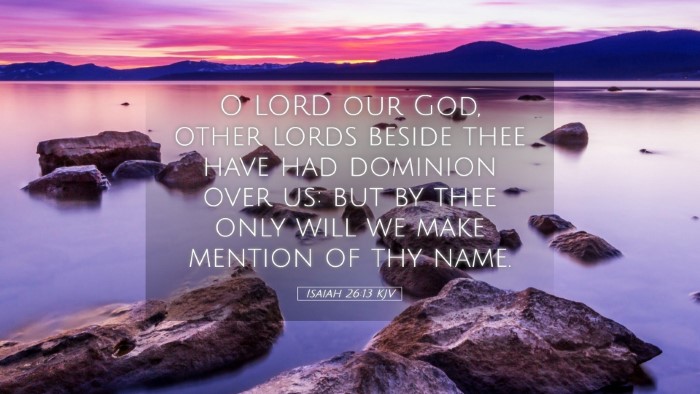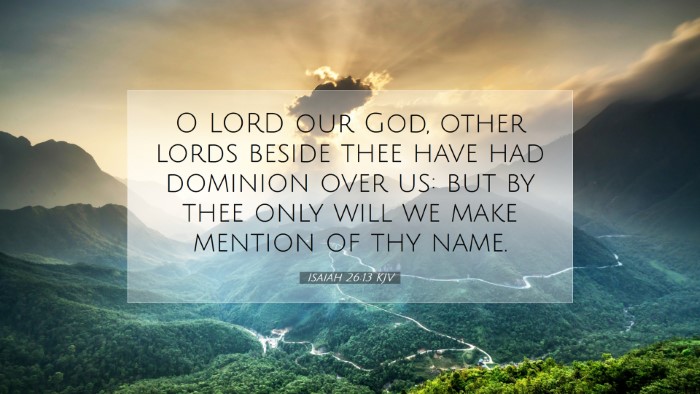Commentary on Isaiah 26:13
The verse Isaiah 26:13 states:
"O Lord our God, other lords besides You have had dominion over us; but by You only we make mention of Your name."
Overview
This verse encapsulates a profound declaration of the sovereignty of God amidst the acknowledgment of the influence of earthly powers. As the Israelites reflect on their history, they recognize the transient authority of rulers and the eternal reign of God. This sentiment is echoed in the commentaries of various esteemed theologians.
Insights from Matthew Henry
Matthew Henry's commentary emphasizes the duality of human experience in relation to divine authority. He notes:
- Recognition of Earthly Lords: Henry points out the acknowledgment of "other lords" suggests a period of subjugation and the reality of divine justice being challenged by temporal powers.
- God's Sovereignty: Despite the dominion of these earthly rulers, the verse asserts that true sovereignty belongs to God alone. Henry reinforces this by interpreting 'mentioning God's name' as an act of worship and reverence, establishing a clear distinction between temporal and eternal authority.
- Confession and Petition: The act of confessing that "other lords" have reigned allows for a heartfelt supplication for God’s intervention, laying bare their reliance upon Him. It embodies the hope that in turning back to God, they will receive His mercy and grace.
Insights from Albert Barnes
Albert Barnes expands on the theological implications of the verse:
- Historical Context: Barnes asserts that the verse reflects Israel's history under various oppressors and rulers, such as Egypt, Babylon, and Assyria. Their experience demonstrates the futility of reliance upon earthly powers, which ultimately leads to disappointment.
- Exclusivity of God’s Authority: He emphasizes the phrase "by You only," illustrating an exclusive allegiance to the Lord. This highlights the path of redemption and restoration through singular devotion to God, freeing Israel from the cycle of servitude to other rulers.
- Identity in God: Barnes notes that the mention of God’s name is intrinsically linked to the identity and faith of the believers. By turning to God, they reclaim their identity from the enslaving rule of other nations, which serves not only as a statement of fact but also an affirmation of faith.
Insights from Adam Clarke
Adam Clarke provides a more personal and emotional interpretation of this text:
- Personal Reflection: Clarke suggests that the acknowledgment of "other lords" speaks to individual and collective struggles of the faithful. The verse can be seen as an introspective moment when believers confront the idols and distractions that have held sway over their lives.
- Divine Restoration: Clarke highlights that the transition back to God’s lordship represents a profound restoration of faith and trust. The verse indicates a conscious choice made by the faithful to prioritize God's rule over the enticements of worldly authority.
- Prayerful Expression: Clarke describes the declaration as a form of prayer—petitioning to God with the understanding that ultimate deliverance and help can be found only in Him. He urges believers to engage in heartfelt confessions, establishing a dialogue with God about their struggles and the areas in which they have allowed other influences to dominate.
Theological Themes
From the insights gleaned from these commentators, several theological themes emerge:
- God’s Sovereignty: The verse affirms the ultimate authority of God over all creation, challenging believers to evaluate their loyalties and prioritizations.
- Human Struggles: It acknowledges the reality of human struggles with various powers and authorities, both internal and external, revealing the complexity of faith in a world filled with competing influences.
- Redemption and Identity: It speaks to the redemptive process wherein believers find their true identity in their allegiance to God, rather than the prevailing systems of the world.
- Prayer and Confession: Finally, it underscores the role of prayer and confession as integral to the faith experience, inviting believers into a restorative relationship with God.
Practical Applications
The insights from Isaiah 26:13 invite contemporary believers to:
- Examine Loyalties: Reflect on areas of life where other "lords" may exert undue influence. This examination can lead to a renewed commitment to prioritize God as the sole authority in their lives.
- Engage in Prayerful Reflection: Use this verse as a basis for prayer, expressing confessions of divided loyalty and seeking God’s help in restoring a singular devotion to Him.
- Communal Confession: Encourage congregational practices of confession and acknowledgment of the church's history of struggling against other powers, fostering a united front grounded in God’s sovereignty.
- Teach and Disciple: Educators and pastors can utilize the insights from this verse to teach about the biblical understanding of authority, submission, and divine sovereignty, equipping others to navigate modern-day challenges.
Conclusion
Isaiah 26:13 serves as a potent reminder of the authority of God over all other claims to power. Drawing from the wisdom of notable commentators, this reflection offers a blend of historical context and theological depth, making it a significant verse for pastors, theologians, and students of the Bible. As believers confront the complexities of faith amidst competing influences, this scripture calls them to reaffirm their commitment to God’s rule, inviting healing, restoration, and true worship.


